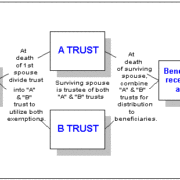The Three Flavors of Special Needs Trusts: #2 Pooled Trusts
Baron Law LLC, Cleveland, Ohio, offers information for you to reflect upon while you are setting out looking for an estate planning attorney to help protect as much of your assets as you can. For more comprehensive information contact Baron Law Cleveland to draft your comprehensive estate plan to endeavor to keep more of your assets for your heirs and not hand them over to the government by way of taxes.
In order for those with special needs to qualify for government assistance programs such as Social Security Income and Medicaid, they must meet health, income, and asset thresholds. In other words, at least on paper, potential recipients must be quite poor to receive benefits. As such, just like to initially receive benefits, if special needs person is already receiving these benefits they must maintain the established thresholds of assets and income, or lack thereof. So, an inheritance, receiving an accident or medical malpractice settlement, or merely amassing too much money in an account can kick these people off of much needed benefits due to violating the standards set down by managing government entities and departments. In the hopes of preventing this outcome proactively, many people turn to special needs trusts.
Special Needs Trusts: Revisited
A special needs trust allows a disabled person to, theoretically, shelter an unlimited amount of assets for their needs without being disqualified from government benefits. As hinted to above, this is because the assets held in a special needs trust properly drafted by experienced Cleveland attorneys are not counted as individual resources for purposes of qualifying for benefits. On paper, at least in the eyes of the government and taxman, the beneficiaries of special needs trusts meet their asset and income thresholds. As a consequence, those special needs persons lucky enough to have a special needs trusts have access to more money, which can be spent on comforts, necessities, housing, and much needed medical care. Though we in this country are lucky to have government assistance programs available to us, anyone with a loved one solely dependent on them will tell you it’s certainly not enough. A properly drafted special needs trust will provide extra care and life satisfaction for disabled loved ones regardless of whether supporting family members are around for many years or pass away suddenly.
Pooled Special Needs Trusts
As mentioned in previous blogs, there are many “flavors” of special needs trusts. One such type is a “pooled” special needs trust. The focal point with this trust is maximizing potential gains from money funded into the trust, minimizing administrative costs, and delegating trust management to experienced personnel. In a nutshell, pooled trusts are a method to provide benefits of a special needs trusts without having to do the administrative legwork yourself.
As a rule, pooled trusts are required to be run by non-profit companies or organizations. The company or organization running the pooled trust drafts a master trust agreement that dictates the terms of the trust and the relationship between the trust and all participants.
In almost all cases, the pooled trust is run by a professional administrator. After establishment of the trust, money is transferred into the pooled trust to fund a particular individual’s stake in the trust. This single source of funding is then pooled with other people’s money to make one big pot, hence the name pooled trust. This pot is then controlled and invested, usually by an investment manager, similar to the way a hedge fund or other investment group operates.
The major takeaway is the “pooled” aspect of this particular trust. In theory, because there are many sources of funding brought together and utilized tactically, a pooled trust can make more stable investments and provide additional management services that other types of special needs trust cannot. Again, this increased investment power and potential returns coupled with lowered administrative costs, because it is borne by a large group instead of the individual and also an individual trustee does not need to be vetted and appointed, is also with the added benefit of the special needs beneficiary still being able to receive government benefits.
Unique Issues with Pooled Special Needs Trusts
The most obvious potential issue with pooled trusts is control, or lack thereof for individual participants. With a pooled trust, the trust assets are managed by people selected by the non-profit organization and not by anyone associated with an individual participant. This, in turn, means unassociated individuals and trust terms dictate how investments proceed and when disbursements occur, pretty much in a take it or leave it style. Once money is surrendered and placed into the pooled trust, individual participants how no say over how it is spent or when it will be distributed. Additionally, it is a little known and little advertised fact that after the special needs beneficiary passes, some or all of their particular trust account will be kept to help with continued funding for the pooled trust. As always read the fine print and be completely sure you know what you’re signing up for.
With pooled trusts you make undertake a pro’s vs. con’s analysis, lack of control versus potential gains that might be indispensable in providing of critical healthcare costs for those with special needs. Consult an experienced Cleveland estate planning attorney who is familiar with drafting and administrating special needs trusts in order to find out potential options and they best course to take. Further, before signing on the dotted line to participate in any pooled trust, have an experienced Ohio estate planning attorney review the master trust agreement. Often these documents are very massive and have many hidden terms that can have profound impacts on your and your loved ones with special needs.











